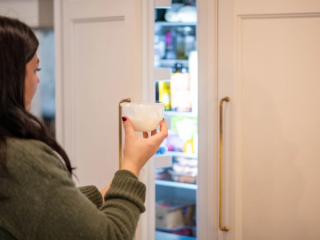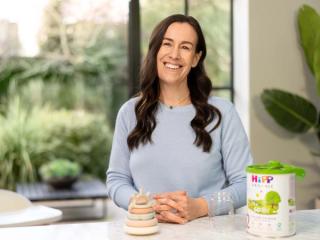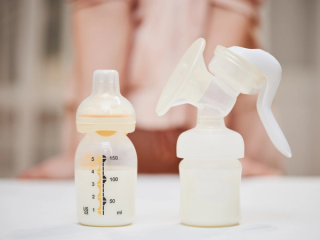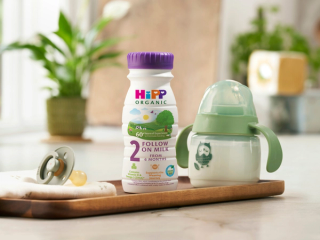
- Home
- Advice Hub
- Baby
- Baby Feeding
- What Can I Eat When Breastfeeding?
What can I eat when breastfeeding?
Discover essential tips on what to eat when breastfeeding, including nutrient-rich foods to support your health and your baby’s development during this important time.
After 9 months of making sure you’ve got all the right vitamins for a growing baby and avoiding all those foods which can be harmful when pregnant, you might be ready to throw the ‘rule book’ out the window. But there are still some foods to avoid when breastfeeding, as well as foods you should try to eat to maintain a healthy, balanced diet.
Of course, a balanced diet is easier said than done, when you are looking after a small baby! Finding time to look after yourself can be tricky, but eating a range of healthy foods will help ensure you’re getting all the nutrients you need to keep your energy up and keep your digestive system moving. It’s also really important to stay hydrated, so keep that water bottle close by whenever you’re feeding your little one.
What foods and drinks should I avoid when breastfeeding?
When it comes to foods to avoid, breastfeeding is not nearly so restrictive as pregnancy. However, there are a few foods and drinks you must be careful of.
Caffeine is a stimulant, the effects of which are thought to pass through the breastmilk to your baby. So, it’s worth reducing the amount of tea, coffee and energy drinks you consume to keep your daily caffeine intake below 300 mg per day. For reference, that’s about two mugs of filter coffee or three mugs of instant coffee per day.
Tea contains less caffeine, at about 75 mg, while energy drink has about 80 mg per 250 ml compared to 40 mg in a 354 ml can of coke. It’s also worth noting that plain chocolate contains up to 50 mg of caffeine per 50 g, so don’t go too mad on it or you might be dealing with a restless baby!
Alcohol is not completely off limits while breastfeeding, but it is recommended that you wait 2-3 hours between drinking and breastfeeding to avoid the risk of alcohol transferring to your baby via your milk. The NHS also recommends limiting your alcohol intake to 1 or 2 units of alcohol once or twice a week (the equivalent of one or two small glasses of wine) and never co-sleeping with a baby when you have been drinking.
All adults are recommended to limit their intake of shark, swordfish and marlin due to the high levels of mercury in them. One portion a week would be plenty. Other types of fish, including fresh tuna, salmon, trout, mackerel, herring, sardines and pilchards, are also on the watch list – eat no more than two portions of these per week.
Foods to be aware of when breastfeeding
Spicy foods
Some parents find that strong-flavoured or spicy foods can affect their baby’s acceptance of their milk, or have an impact on the baby’s digestive system – for example, making them gassy, or more explosive than usual! You don’t have to avoid these foods, but if you notice your baby is more uncomfortable than usual, it might be worth keeping track of how your baby reacts to your diet and consider adjusting accordingly.
Herbs
Herbal remedies are largely unresearched – so whether they claim to reduce your milk supply or increase it, tread very carefully. In fact, even if the herbal remedy makes no mention of milk supply at all – for example, those ‘herbal teas’ sold as weight loss solutions, be cautious and consult your GP before adding them to your diet. In all likelihood, these herbal remedies will not have been tested on pregnant and breastfeeding women, so their impact is unknown and the results unproven.
Peanuts and other allergens
Allergens, such as nuts or dairy, should only be avoided if you or your baby are allergic to them. You can’t prevent your baby from developing a nut allergy, for example, simply by not eating peanuts while you’re pregnant and breastfeeding. However, if you have a family history of food allergies or other allergic conditions, then your baby may be at higher risk of developing an allergy, and you may wish to discuss this further with your GP, midwife or health visitor.
Presuming that isn’t the case, peanuts, or foods containing peanuts, such as peanut butter, can be included as part of a healthy, varied diet while breastfeeding. As can all the other allergens out there.
Cows’ milk allergy (CMA)
Cows’ milk allergy is one of the most common childhood food allergies. If your child is allergic to cows’ milk and you are breastfeeding, you may be advised to eliminate dairy from your diet.
How will I know if my child is allergic to dairy? (h4)
There are various symptoms of CMA, including skin reactions, swelling, sickness, diarrhoea or constipation, eczema and a runny or blocked nose. Lactose intolerance has similar symptoms. Both the allergy and the intolerance may only be temporary but can cause great discomfort, so it is worth trying to alleviate the symptoms by eliminating dairy from your baby’s diet – and from your diet while breastfeeding. As a first port of call, however, always speak to your healthcare professional. They can advise you on the best course of action.
What should I eat when breastfeeding?
As with the herbs, so with the rest of the food groups. Apply critical thinking when it comes to foods or recipes that claim to increase your milk supply. These claims are largely unproven. The best thing you can do to maintain or increase milk production is eat a well-balanced diet, keep your fluid intake up and feed on demand – especially while you’re establishing breastfeeding. Here is a quick recap of what makes a healthy, balanced diet.
As with during pregnancy, it is recommended that breastfeeding women try to get at least five portions of fruit and veg into their diet each day.
Consuming a wide variety will ensure you and your baby receive a diverse portfolio of essential vitamins and minerals, along with fibre. The fruits and veg you choose needn’t be fresh, either. Frozen, juiced, dried or tinned fruit and veg are all just as good – just watch out for any added salts or sugars.
Some good fruits and vegetables to eat when breastfeeding include:
Frozen berries
Fresh banana
Leafy greens like spinach, cabbage, and kale
Beans and pulses like chickpeas and kidney beans (an 80g portion of these only counts once as part of your five a day, no matter how much you eat)
Dried fruits, like figs and apricots
150ml fruit juice or smoothie (as they are high in sugar only 150ml and no more is recommended per day)
Tinned pineapple rings (in fruit juice rather than syrup)
Starchy foods are a good source of energy and some other important nutrients. By eating a range of starchy foods when breastfeeding like bread, pasta, rice, and potatoes, you can up your energy levels, as well your fibre, calcium, iron and B vitamins intake.
To make sure you’re eating as healthy and balanced as possible, aim for wholegrains rather than refined varieties where possible, as they are higher in fibre. Also try to ensure that your main meals are based on starchy foods, as recommendations are that they account for one-third of your daily calories.
Some good starchy foods to include in your breastfeeding diet are:
Jacket potatoes (keeping the skin on potatoes provides more fibre)
Wholegrain rice and bread
Wholegrain cereals like porridge oats and sugar-free muesli
Wholewheat pasta
Why is fibre important? Well, it can help improve digestive health– very important in the post-partum phase when women can develop bowel problems and constipation.
Protein is a broad category that comprises meat, fish, poultry, eggs, nuts, beans, and pulses, providing a diverse range of vitamins and minerals for breastfeeding women.
But not all protein sits at the top of the nutrition tree – some meats, like beef, lamb and pork can be high in fat. To reduce your fat intake, opt for leaner cuts of meat and skinless poultry instead for a healthy balanced diet when breastfeeding.
It is also advisable to limit or avoid processed meat like bacon, ham, and sausages, as well as canned or smoked fish, as they can contain high amounts of salt. The same goes for choosing unsalted nuts versus their high-salt varieties.
Some protein-rich foods that are good during breastfeeding include:
Lean steak, turkey mince, and chicken breast
Oily fish like salmon, sardines, and mackerel (oily fish are high in long-chain omega-3 fatty acids which can help your baby’s nervous system develop. However, breastfeeding women should have no more than two portions of oily fish a week)
Omelettes and boiled eggs (those with a red lion stamp are safe to eat raw or partially cooked)
Hummus with wholemeal bread or vegetable sticks
Dairy and dairy alternatives provide some protein and calcium, both of which contribute towards a healthy balanced breastfeeding diet. It should be noted, however, that some dairy products also have a high fat content.
As such, it is advised that breastfeeding women (and everyone, really!) check the label on dairy products for saturated fat, salt, and sugar. Where possible, opt for low-fat varieties like semi-skimmed or skimmed-milk rather than full fat milk, and low-fat, low-sugar yogurts rather than fruit-flavoured types (you can always throw in some fresh berries to satisfy that sweet tooth anyway).
Some dairy foods that are beneficial when breastfeeding include:
Fat-free Greek yogurt
Reduced fat cheddar, or low-fat varieties like mozzarella
Unsweetened soya yogurt/milk
Skimmed milk
Choose unsaturated oils such as rapeseed or olive oil, and spreads made from these, and consume in small amounts.
To help reduce your fat intake further, opt for leaner cuts of meat and mince, and limit or avoid processed meat like bacon, ham, and sausages, as well as canned or smoked fish, as they can contain high amounts of salt.
If you choose to include foods or drinks high in fat, salt and sugars, such as biscuits, cakes, pastries and salty snacks, have them less often and in small amounts.
It’s so important to keep hydrated while you’re breastfeeding, so always keep a drink handy. Water is your best option, but if you prefer something with a bit more flavour, why not try adding sliced fruit, mint leaves or cucumber to your water? With a straw and one of those paper umbrellas, you could pretend you’re at a spa!
In the UK, we’re all recommended to take 10 mcg of vitamin D daily during the darker months of the year. However, for pregnant and breastfeeding women, this is extended to all year round.
You can get all the other vitamins and minerals you need by eating a healthy balanced diet. However, if you’re worried you’re not getting all the nutrients you need, speak to your healthcare professional for advice.
Generally speaking, the recommendations for breastfeeding diet are the same as for the healthy eating recommendations for every one – so as long as you try to keep a healthy balance across the week (and keep your fluids up!) you’ll be fine. For tips on looking after yourself while you’re breastfeeding, feeding your baby, and more, plus discounts and offers on partner products, join the HiPP BabyClub HERE!
FAQs about what to eat when breastfeeding
If you see a product claiming to increase breastmilk production, tread carefully. Research in this area is very limited and these claims are largely unproven. The best thing you can do for your milk supply is to look after yourself: eat a well-balanced diet, keep your fluid intake up, rest when you can, and feed on demand – especially while you’re establishing breastfeeding. If you are worried about your milk supply, speak to your healthcare professional for further advice.
Some parents find that certain foods they eat produce a reaction in their breastfeeding baby. This is because traces of what you eat and drink can pass through to your breast milk. This is very personal – we can’t make sweeping generalisations about all babies reacting to specific food types, so if you think your baby is sensitive to certain foods or drinks, try to keep track of their reactions and consider avoiding those foods that are causing sensitivities.
Sometimes, babies are born with allergies to specific foods – such as cows’ milk – and they can experience a reaction to those foods even just from drinking your breastmilk. If you are worried that your baby has a food sensitivity, talk to your health visitor or GP.
It can be frustrating to feel that your milk supply isn’t keeping up with your baby’s demands. If you feel you need to increase your milk production, talk to your healthcare professional, who will be able to advise ways to proceed. This will likely include feeding on demand, increasing your fluid intake, and eating a well-balanced diet.












